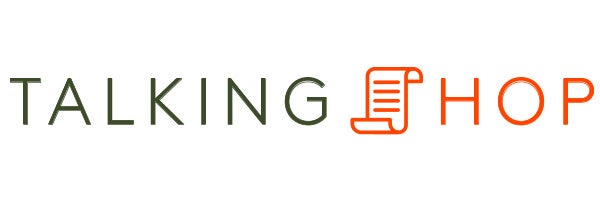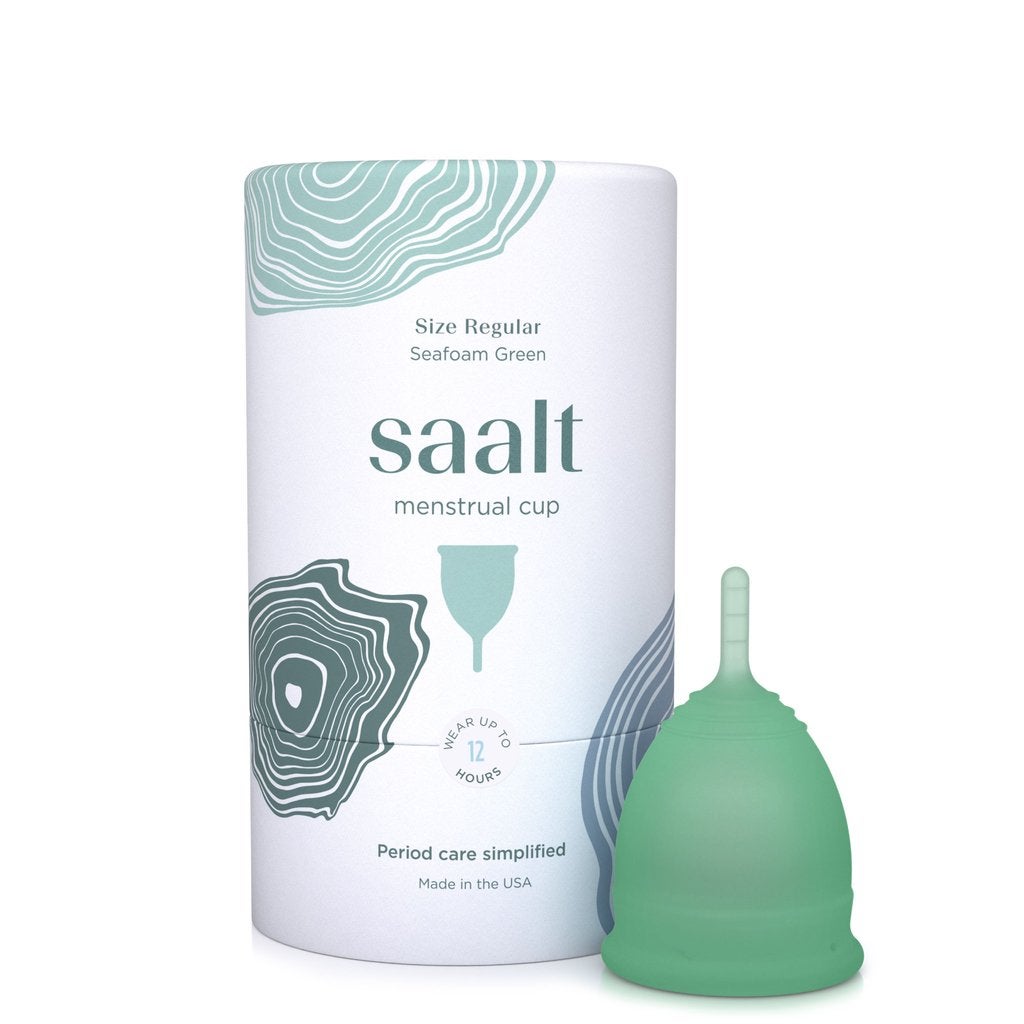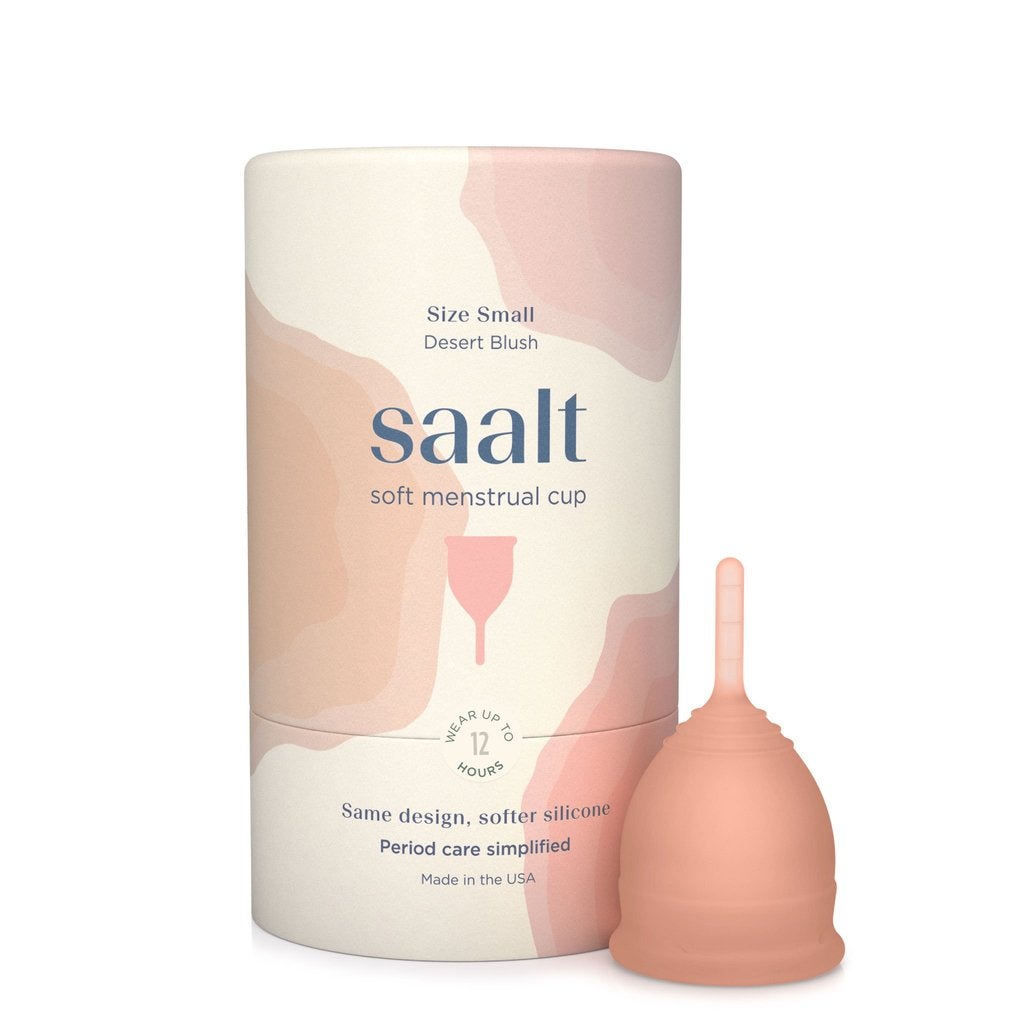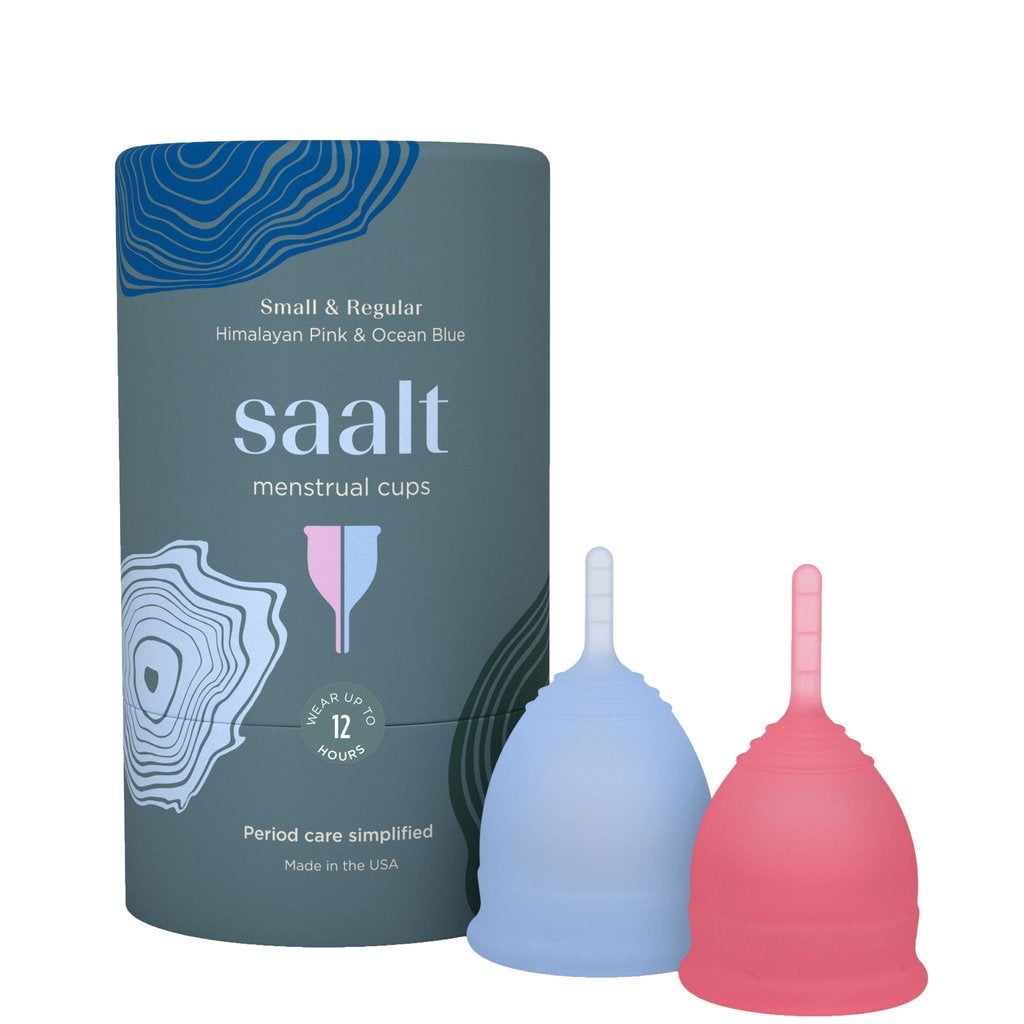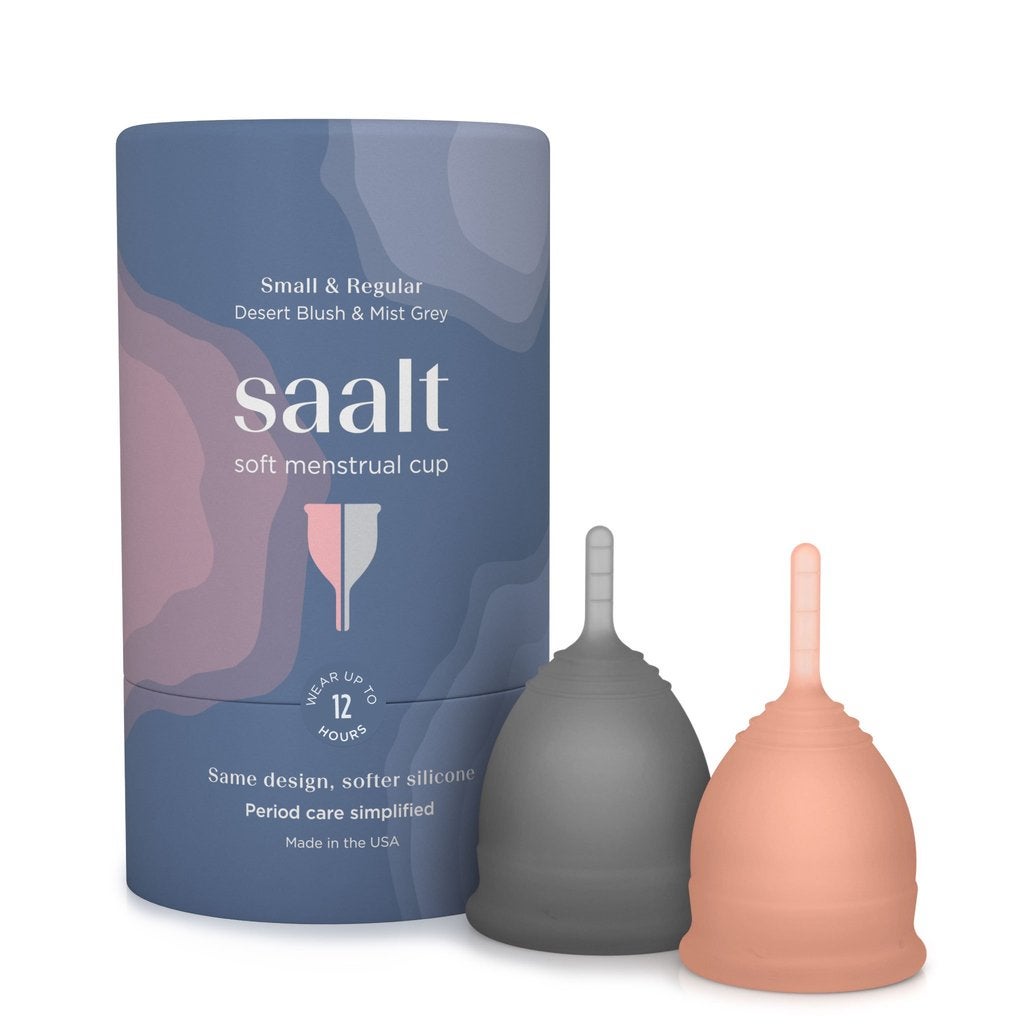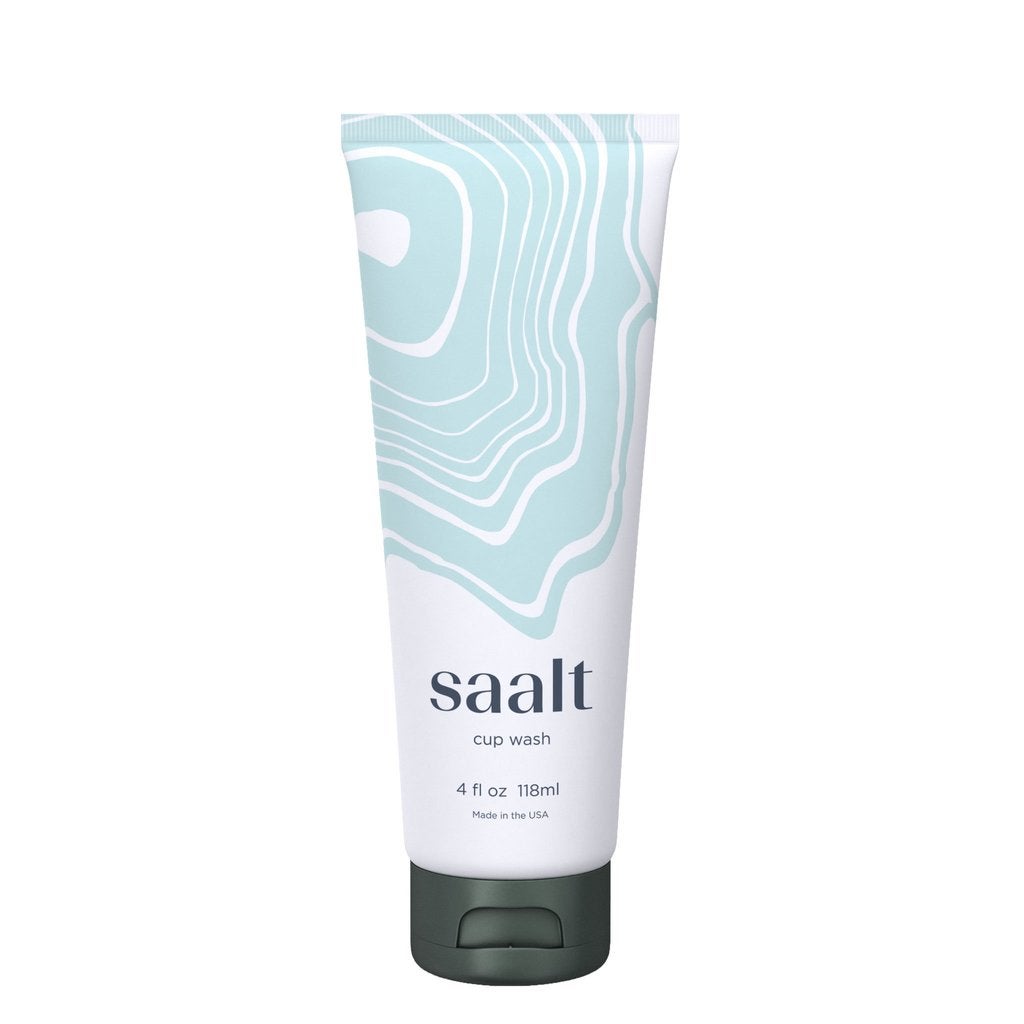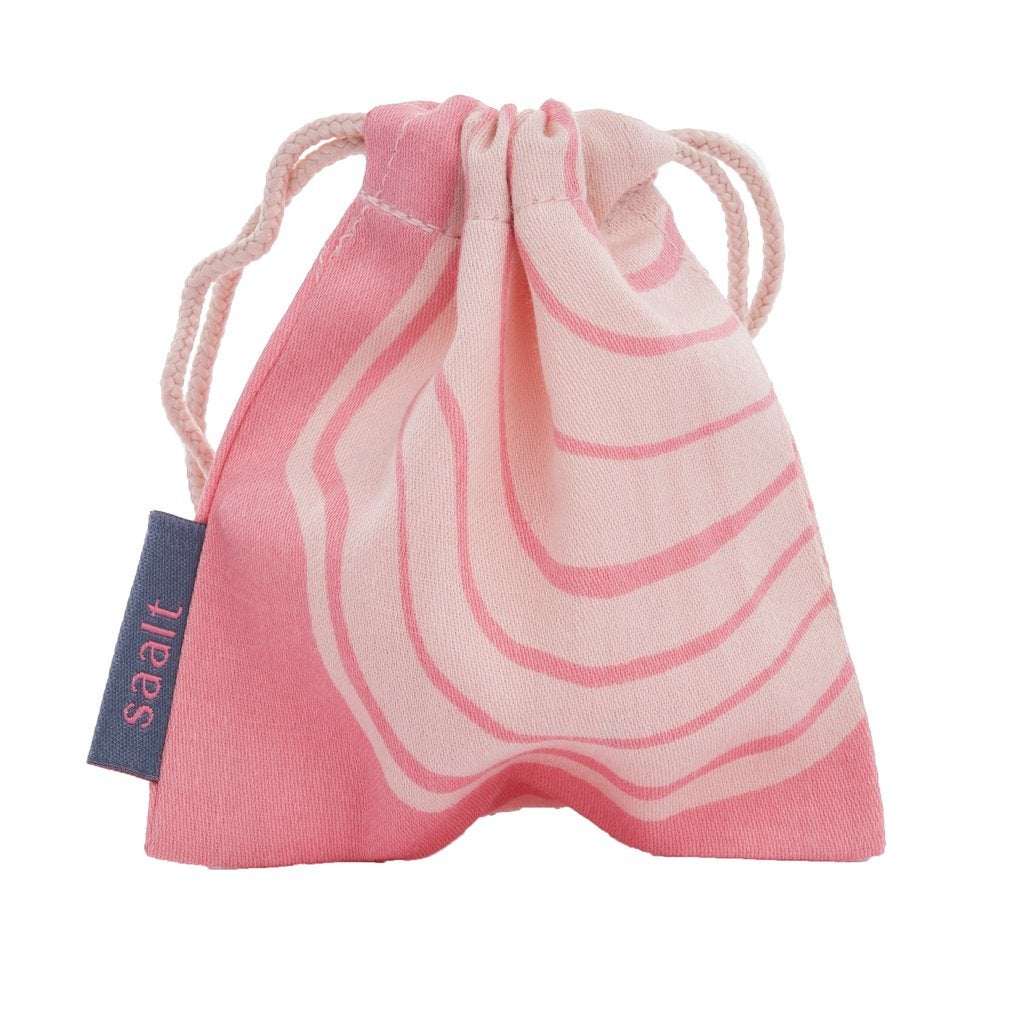This Startup Founder Is De-Stigmatizing Periods One Menstrual Cup At A Time
In the year 2020, menstruation is still stigmatized. To anyone who has a period, this certainly isn't news. And Cherie Hoeger, a mother of five daughters with family members in Venezuela that once went months without access to period care, has long been acutely aware of this taboo. It's what set her on the path to create Saalt, a sustainable, reusable menstrual cup brand.
Saalt launched in 2018 with its first reusable silicone cup, which offers 12 hours of protection. Beyond simply offering innovative period products, however, the brand has a larger mission to educate people globally about menstrual health and help bring the period cup into the mainstream. Saalt is doing all of this in the name of sustainability, wellness, and normalizing menstruation.
AdvertisementADVERTISEMENT
In this month's edition of Talking Shop, Hoeger talks about teaming up with her husband to found Saalt. She explains why her writing background has been essential to her entrepreneurial ventures and walks us through the process of landing her dream retailer by talking candidly about periods. The co-founder also shares just how important it is for businesses to be mission-focused now and in the future.
Refinery29: Walk me through the process of launching Saalt.
Cherie Hoeger: The spark for Saalt really started when I had a phone call with my husband's aunt in Venezuela, and the situation there is pretty dire. She was describing a scenario that we're all a little bit more familiar with now where she just couldn't get anything on grocery shelves, so no hygiene items, no food, no diapers and formula for the children, let alone things like pads and tampons. I have five daughters and that really got me thinking and led me to a lot of research on what reusable options were out there. I thought, what would I do in that situation? That's when I was first introduced to the period cup, and I was immediately sold on the benefits — it's clean, nontoxic, you can wear it for 12 hours at a time, sleep with it in, it's comfortable, and it can last for 10 years. I thought where has this been my whole life? Why haven't I tried this option before?
So I bought several to try out, and I just couldn't find one that met all my ideal criteria and fit well with my anatomy so I roped my husband into helping me custom design a new model with a 3D CAD system. We got to creating what we hoped would be the perfect cup that would be great for beginners and a mainstream consumer. We had 14 iterations of design to get the design right. Working with the factory that creates our cup, it was a $20,000 investment to etch the design, so I remember that being a pretty big moment for us to say, "Okay, do we feel confident enough in this minimum viable product that it's going to catch on that we can make this investment?" So there's certainly a lot of risks when you go the entrepreneur route. There's plenty of investments that we've had in the past that either go well or don't go so well. You just learned to take on that risk and you learn to live with uncertainty. So we did, we thought that it was a good design, and we're so grateful that it caught on well.
We did create a focus group to help us launch our business. We gave them all free products. We asked them to test the products and see what they liked. It was a focus group of a thousand members on a private Facebook group, and we asked them all sorts of questions from branding and imagery to, "Do you like this copy or this copy? Do you like these colors?" We would AB test all these questions, and try to find what would resonate with our consumer. Once we had our branding mapped out, we had our product, we had our packaging, and so forth, that focus group acted as a platform for us so that when we launched our website in February of 2018, we were able to launch it with a little bit of a bang. We weren't just completely silent because we had people opening the packaging on Instagram, doing unboxing experiences, and sharing with their friends. So it really worked well for us to be able to share that startup journey with our consumer base. We found that we created some really good ambassadors because of it.
Cherie Hoeger: The spark for Saalt really started when I had a phone call with my husband's aunt in Venezuela, and the situation there is pretty dire. She was describing a scenario that we're all a little bit more familiar with now where she just couldn't get anything on grocery shelves, so no hygiene items, no food, no diapers and formula for the children, let alone things like pads and tampons. I have five daughters and that really got me thinking and led me to a lot of research on what reusable options were out there. I thought, what would I do in that situation? That's when I was first introduced to the period cup, and I was immediately sold on the benefits — it's clean, nontoxic, you can wear it for 12 hours at a time, sleep with it in, it's comfortable, and it can last for 10 years. I thought where has this been my whole life? Why haven't I tried this option before?
So I bought several to try out, and I just couldn't find one that met all my ideal criteria and fit well with my anatomy so I roped my husband into helping me custom design a new model with a 3D CAD system. We got to creating what we hoped would be the perfect cup that would be great for beginners and a mainstream consumer. We had 14 iterations of design to get the design right. Working with the factory that creates our cup, it was a $20,000 investment to etch the design, so I remember that being a pretty big moment for us to say, "Okay, do we feel confident enough in this minimum viable product that it's going to catch on that we can make this investment?" So there's certainly a lot of risks when you go the entrepreneur route. There's plenty of investments that we've had in the past that either go well or don't go so well. You just learned to take on that risk and you learn to live with uncertainty. So we did, we thought that it was a good design, and we're so grateful that it caught on well.
We did create a focus group to help us launch our business. We gave them all free products. We asked them to test the products and see what they liked. It was a focus group of a thousand members on a private Facebook group, and we asked them all sorts of questions from branding and imagery to, "Do you like this copy or this copy? Do you like these colors?" We would AB test all these questions, and try to find what would resonate with our consumer. Once we had our branding mapped out, we had our product, we had our packaging, and so forth, that focus group acted as a platform for us so that when we launched our website in February of 2018, we were able to launch it with a little bit of a bang. We weren't just completely silent because we had people opening the packaging on Instagram, doing unboxing experiences, and sharing with their friends. So it really worked well for us to be able to share that startup journey with our consumer base. We found that we created some really good ambassadors because of it.
AdvertisementADVERTISEMENT
That's such a savvy approach to the whole process. Do you have a background in business? Did you go to business school or have any kind of other formal training that led you to decide on this focus group/ brand ambassador strategy?
I didn't. I went to college with an English major and editing emphasis, and I've always worked in technical writing. That said, I have a very, very visionary husband, and we knew we were going to be entrepreneurs right away from the day that we were married. We knew that we wanted to be in business for ourselves so we were constantly going after business ideas. Fortunately, we really compliment each other well — he has a visionary mindset and I'm the type that implements ideas very quickly so together we make a good team. So we've done a lot of different entrepreneurial ventures: we've had e-commerce businesses, we've done a lot in commercial and residential real estate.
We have a history of a lot of ideas, but I've always been a freelance technical writer. I've helped co-author seven editions of college textbooks in the field of fitness and wellness. That's been primarily what I've done aside from working together with my husband on a lot of businesses. This has been the first that we've done together where I've been very much at the forefront. I was a little bit more behind the scenes with the others, so it's been a transition for us but a very welcome one.
I didn't. I went to college with an English major and editing emphasis, and I've always worked in technical writing. That said, I have a very, very visionary husband, and we knew we were going to be entrepreneurs right away from the day that we were married. We knew that we wanted to be in business for ourselves so we were constantly going after business ideas. Fortunately, we really compliment each other well — he has a visionary mindset and I'm the type that implements ideas very quickly so together we make a good team. So we've done a lot of different entrepreneurial ventures: we've had e-commerce businesses, we've done a lot in commercial and residential real estate.
We have a history of a lot of ideas, but I've always been a freelance technical writer. I've helped co-author seven editions of college textbooks in the field of fitness and wellness. That's been primarily what I've done aside from working together with my husband on a lot of businesses. This has been the first that we've done together where I've been very much at the forefront. I was a little bit more behind the scenes with the others, so it's been a transition for us but a very welcome one.
AdvertisementADVERTISEMENT
Do you feel like your technical writing in the wellness space has informed your work in the menstrual health and hygiene sphere?
Yes, very much so. As a technical writer, you take these complex processes in nutrition or fitness, and you break them down into actionable steps to try to create behavior change in people. I have found that with Saalt, it's very much a similar process. We're taking something that's ambiguous and maybe a little scary — reusable period care — and taking away the stigma, taking away the fear factor, and breaking it down into actionable steps of, "Okay, this is how you get through the learning curve." It's a lot of education so it transfers very well.
I will also say that you would imagine that you'd write a lot when working on college textbooks, which I do, but I'll tell you, I've never written more than I have in our business ventures, between website copy, instructions, press releases, interviews. The writing just never ends, so it's been a very useful skill. I think an English degree is a really great platform for any entrepreneur.
Yes, very much so. As a technical writer, you take these complex processes in nutrition or fitness, and you break them down into actionable steps to try to create behavior change in people. I have found that with Saalt, it's very much a similar process. We're taking something that's ambiguous and maybe a little scary — reusable period care — and taking away the stigma, taking away the fear factor, and breaking it down into actionable steps of, "Okay, this is how you get through the learning curve." It's a lot of education so it transfers very well.
I will also say that you would imagine that you'd write a lot when working on college textbooks, which I do, but I'll tell you, I've never written more than I have in our business ventures, between website copy, instructions, press releases, interviews. The writing just never ends, so it's been a very useful skill. I think an English degree is a really great platform for any entrepreneur.
You mentioned the risk that comes along with making investments in a new venture. Were you mostly bootstrapping in the beginning? Have you received any funding for the business? If so, what kind?
I think all entrepreneurs are bootstrapping, especially in this age, but we've been fortunate to be able to self-fund our business aside from an SBA loan that we got to fund some inventory. So to this day, it's out of our real estate business proceeds. A lot of times you have another business going while you start a new one, that's very much been the case for us.
I think all entrepreneurs are bootstrapping, especially in this age, but we've been fortunate to be able to self-fund our business aside from an SBA loan that we got to fund some inventory. So to this day, it's out of our real estate business proceeds. A lot of times you have another business going while you start a new one, that's very much been the case for us.
AdvertisementADVERTISEMENT
So you and your husband started Saalt. How many people do you employ now?
We have 33 employees and four interns — we love our interns. We have been growing like gangbusters, especially during this COVID time when essentials are, well, essential. Interest has increased a lot in sustainable, more cost-effective options. So we've been trying to keep up with the demand.
We are also an 89% female company and because of that, we're always looking for creative solutions to problems for working women. For example, the cost of childcare is one of the biggest problems for women who want to work. So one way that we are addressing that is by having an in-office preschool that's available five days a week with two full-time preschool teachers, which is free to all of our employees. We have many working dads also on our team that utilize the preschool. This has been game-changing for us because we're able to access this pool of talent that may have been sitting on the sidelines. Now, we can bring them into our company, give them a way to contribute, and solve that issue of childcare and that burden that so many women carry.
We have 33 employees and four interns — we love our interns. We have been growing like gangbusters, especially during this COVID time when essentials are, well, essential. Interest has increased a lot in sustainable, more cost-effective options. So we've been trying to keep up with the demand.
We are also an 89% female company and because of that, we're always looking for creative solutions to problems for working women. For example, the cost of childcare is one of the biggest problems for women who want to work. So one way that we are addressing that is by having an in-office preschool that's available five days a week with two full-time preschool teachers, which is free to all of our employees. We have many working dads also on our team that utilize the preschool. This has been game-changing for us because we're able to access this pool of talent that may have been sitting on the sidelines. Now, we can bring them into our company, give them a way to contribute, and solve that issue of childcare and that burden that so many women carry.
What is a small business to you?
I see small businesses as vehicles to move the world forward because they're run by entrepreneurs that are by nature, game-changers, innovators, and out-of-the-box thinkers. You have to have a lot of muscle and grit when you're a small business, and you have to hire people that are willing to take on anything. When people come into Saalt, we always tell them the same thing: "Even though you're hired for a specific role, the only thing we can guarantee in a startup is that things will change. You'll be asked to do new things, wear a lot of hats, and pivot to fill the holes." You need people who are self-starters.
I see small businesses as vehicles to move the world forward because they're run by entrepreneurs that are by nature, game-changers, innovators, and out-of-the-box thinkers. You have to have a lot of muscle and grit when you're a small business, and you have to hire people that are willing to take on anything. When people come into Saalt, we always tell them the same thing: "Even though you're hired for a specific role, the only thing we can guarantee in a startup is that things will change. You'll be asked to do new things, wear a lot of hats, and pivot to fill the holes." You need people who are self-starters.
AdvertisementADVERTISEMENT
What has been your biggest business challenge with Saalt so far?
When we started Saalt, we knew that these long-held stigmas around periods presented both our greatest challenge and also opportunity. From the outset, we knew we were entering a product category that's still really taboo for a lot of people so we decided to take that head on by creating beautiful, high-end packaging that placed the cup on a pedestal and showcased it for what it really is: a better user experience over disposable that's also healthier, more comfortable, more sustainable. We were very deliberate about our brand and voice to be able to elevate sustainable period care to sit on the same shelf as clean personal care products while also actively working to normalize periods and educate consumers. You could look at a stigma as a huge challenge. The fact that this is an FDA-regulated medical device could scare off a lot of people and the learning curve could scare off a lot of people, but we saw it as an opportunity.
When we started Saalt, we knew that these long-held stigmas around periods presented both our greatest challenge and also opportunity. From the outset, we knew we were entering a product category that's still really taboo for a lot of people so we decided to take that head on by creating beautiful, high-end packaging that placed the cup on a pedestal and showcased it for what it really is: a better user experience over disposable that's also healthier, more comfortable, more sustainable. We were very deliberate about our brand and voice to be able to elevate sustainable period care to sit on the same shelf as clean personal care products while also actively working to normalize periods and educate consumers. You could look at a stigma as a huge challenge. The fact that this is an FDA-regulated medical device could scare off a lot of people and the learning curve could scare off a lot of people, but we saw it as an opportunity.
You all did create a truly beautiful product, which is unexpected for a period cup. On the opposite end of that, what has been your biggest business win?
I would say pitching to Target in only our second year of business was definitely one of the proudest moments of my career. Target has always been our dream retailer. When we were debating back and forth on packaging design, what we kept coming back to is that it had to be Target-worthy. We knew it had to be beautiful and be something that would resonate with Target customers.
The way that it came about is my husband, who is also co-founder, joined me at a trade show in Florida that was essentially speed dating with retailers. We pitched to 26 retailers in 48 hours, and one of them was a Target buyer. You can imagine how nervous we were. I had only pitched one other major retail buyer previous to that — I won't name who it is, but that buyer was very closed-minded to cups and a bit stone-faced so I had no idea what to expect. To our surprise, that Target buyer was not only a progressive thinker who was all for sustainable products but a big menstrual cup fan herself. She'd been passing different cups all around the office for her coworkers to try so she gave us great feedback on what we could change in our packaging to make it more shelf-ready for the retail consumers. She was so gracious, friendly, and encouraging. I thought I was a big fan of Target before interacting with her, but it just cemented that Target was exactly who we wanted to partner with.
So you can imagine our excitement when we got invited to Minnesota for live reviews, which meant that we got to do a follow-up meeting with the buyer for about 20 minutes. There was a point in that interview where she looked up at us and she said, "I have looked at a lot of cups and I really think your brand is best positioned to take the cup mainstream." I just wanted to pinch myself because we had been deliberate about what we wanted — we wanted it to speak to a mainstream consumer and we wanted it to be Target-worthy. Now, here she is saying, "Out of all the competitors, your brand stands out. We want you in Target." It was incredibly validating as an entrepreneur and our sales have been even better than expected with Target. We were able to launch exclusively the next year nationwide in all Target stores and it catapulted us.
I would say pitching to Target in only our second year of business was definitely one of the proudest moments of my career. Target has always been our dream retailer. When we were debating back and forth on packaging design, what we kept coming back to is that it had to be Target-worthy. We knew it had to be beautiful and be something that would resonate with Target customers.
The way that it came about is my husband, who is also co-founder, joined me at a trade show in Florida that was essentially speed dating with retailers. We pitched to 26 retailers in 48 hours, and one of them was a Target buyer. You can imagine how nervous we were. I had only pitched one other major retail buyer previous to that — I won't name who it is, but that buyer was very closed-minded to cups and a bit stone-faced so I had no idea what to expect. To our surprise, that Target buyer was not only a progressive thinker who was all for sustainable products but a big menstrual cup fan herself. She'd been passing different cups all around the office for her coworkers to try so she gave us great feedback on what we could change in our packaging to make it more shelf-ready for the retail consumers. She was so gracious, friendly, and encouraging. I thought I was a big fan of Target before interacting with her, but it just cemented that Target was exactly who we wanted to partner with.
So you can imagine our excitement when we got invited to Minnesota for live reviews, which meant that we got to do a follow-up meeting with the buyer for about 20 minutes. There was a point in that interview where she looked up at us and she said, "I have looked at a lot of cups and I really think your brand is best positioned to take the cup mainstream." I just wanted to pinch myself because we had been deliberate about what we wanted — we wanted it to speak to a mainstream consumer and we wanted it to be Target-worthy. Now, here she is saying, "Out of all the competitors, your brand stands out. We want you in Target." It was incredibly validating as an entrepreneur and our sales have been even better than expected with Target. We were able to launch exclusively the next year nationwide in all Target stores and it catapulted us.
AdvertisementADVERTISEMENT
I have to imagine that you often found yourself pitching to people who don't have periods and who might not really understand the need for this type of product or perhaps don’t even want to hear about it? Even people who do menstruate are sometimes closed off to talking about these types of products in particular. Did you experience that at all when pitching to potential retailers?
Yes, definitely. Being an entrepreneur in the menstrual industry, I would say that my days are TMI all day in the office. But outside the office, you definitely have to be more careful in how you approach the conversation to get to a place of openness and feeling comfortable. The advice that I would give to everyone is when we're approaching this conversation, the people that we’re talking to, whether they're friends, colleagues, people of any gender, they take their cues from us. So if we're visibly uncomfortable talking about periods in an open setting, then they're going to take those cues and also feel uncomfortable to approach it in a straightforward manner. I mean, 50% of the population menstruates, right? And if you talk about it on a human level, then you start to see their demeanors change.
Yes, definitely. Being an entrepreneur in the menstrual industry, I would say that my days are TMI all day in the office. But outside the office, you definitely have to be more careful in how you approach the conversation to get to a place of openness and feeling comfortable. The advice that I would give to everyone is when we're approaching this conversation, the people that we’re talking to, whether they're friends, colleagues, people of any gender, they take their cues from us. So if we're visibly uncomfortable talking about periods in an open setting, then they're going to take those cues and also feel uncomfortable to approach it in a straightforward manner. I mean, 50% of the population menstruates, right? And if you talk about it on a human level, then you start to see their demeanors change.
That's really great advice. What is your ultimate goal with Saalt?
We have a very big goal for a long term vision — we like to call it our BHAG, our big, hairy, audacious goal — and that is to be the most recognized reusable period care company in the world, which is pretty hefty. We don't ever want to carry single-use disposable products. We will only carry reasonable products that are good for our bodies and the planet, which means that in order to grow beyond just our cups, we really need to be innovating in the category to get there. So a lot of my time is spent in product development, and I'll say that we have a lot of exciting things coming down the pipeline in the next few months. We're really excited to make a big splash in the reusable period care space.
We have a very big goal for a long term vision — we like to call it our BHAG, our big, hairy, audacious goal — and that is to be the most recognized reusable period care company in the world, which is pretty hefty. We don't ever want to carry single-use disposable products. We will only carry reasonable products that are good for our bodies and the planet, which means that in order to grow beyond just our cups, we really need to be innovating in the category to get there. So a lot of my time is spent in product development, and I'll say that we have a lot of exciting things coming down the pipeline in the next few months. We're really excited to make a big splash in the reusable period care space.
AdvertisementADVERTISEMENT
Is there anything else you want to share about Saalt or running a small business?
We are a certified B Corp with a superset give-back mission. We give 2% of our revenue back in three main pillars: menstrual health, environmental sustainability, and educational scholarships. We fund educational scholarships for girls every year, and we also donate thousands of menstrual cups across the world. I think that we've donated to 24 countries and over 12,000 cups. We have partners across the world where we give them regular donations of cups to try to solve that problem for the people. It’s the most impactful thing we do, it's at the core of who we are.
When I look at the millennials and Gen Z consumer bases — millennials are going to represent 75% of the global workforce — what I see is that they want to support businesses that align with their values. That means that just for-profit business, without purpose and mission, is not going to fly in the future. What I see is businesses of the future need to be very mission-focused. So I would love to see more entrepreneurs embrace their ability to serve the world through the B Corp model and through social enterprise as they start their ventures because I just believe it's the way of the future. I think it's focusing on conscious capitalism in every aspect of the business from sourcing products responsibly, paying fair wages, inclusivity and transparency, and using business as a force for good. This is what gives me hope for the future.
We are a certified B Corp with a superset give-back mission. We give 2% of our revenue back in three main pillars: menstrual health, environmental sustainability, and educational scholarships. We fund educational scholarships for girls every year, and we also donate thousands of menstrual cups across the world. I think that we've donated to 24 countries and over 12,000 cups. We have partners across the world where we give them regular donations of cups to try to solve that problem for the people. It’s the most impactful thing we do, it's at the core of who we are.
When I look at the millennials and Gen Z consumer bases — millennials are going to represent 75% of the global workforce — what I see is that they want to support businesses that align with their values. That means that just for-profit business, without purpose and mission, is not going to fly in the future. What I see is businesses of the future need to be very mission-focused. So I would love to see more entrepreneurs embrace their ability to serve the world through the B Corp model and through social enterprise as they start their ventures because I just believe it's the way of the future. I think it's focusing on conscious capitalism in every aspect of the business from sourcing products responsibly, paying fair wages, inclusivity and transparency, and using business as a force for good. This is what gives me hope for the future.
This interview was edited for length and clarity.
In Refinery29's new Talking Shop series, we're chatting with owners of up-and-coming small businesses about their experiences launching, the big challenges and wins they've faced, and of course, their products and services. Discover new spots to patronize, while getting an intimate look at what it takes to run a small business in today's economy. Do you run a small business or do you want to recommend a small business you'd like to see featured on Talking Shop? Tell us more about it here.
AdvertisementADVERTISEMENT







